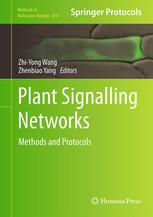

Most ebook files are in PDF format, so you can easily read them using various software such as Foxit Reader or directly on the Google Chrome browser.
Some ebook files are released by publishers in other formats such as .awz, .mobi, .epub, .fb2, etc. You may need to install specific software to read these formats on mobile/PC, such as Calibre.
Please read the tutorial at this link. https://ebooknice.com/page/post?id=faq
We offer FREE conversion to the popular formats you request; however, this may take some time. Therefore, right after payment, please email us, and we will try to provide the service as quickly as possible.
For some exceptional file formats or broken links (if any), please refrain from opening any disputes. Instead, email us first, and we will try to assist within a maximum of 6 hours.
EbookNice Team

Status:
Available4.6
6 reviewsSignal transduction is the fundamental mechanism for regulation of cellular activities by environmental cues and regulatory signals, and is particularly important for plants, whose survival requires proper physiological and developmental responses to the environmental changes. Much progress has been made recently in the plant signal transduction research field thanks to the development of diverse techniques which are covered in Plant Signalling Networks: Methods and Protocols. These include advanced research methods such as proteomics and mass spectrometry methods for studying protein modification, biochemical and cell biological tools for studying protein-protein interactions, genomic techniques for dissecting protein-DNA interaction and transcription networks, and computation methods that integrate molecular network into plant developmental processes. Written in the successful Methods in Molecular Biology™ series format, chapters include introductions to their respective topics, lists of the necessary materials and reagents, step-by-step, readily reproducible protocols, and notes on troubleshooting and avoiding known pitfalls.
Plant Signalling Networks: Methods and Protocols presents well-honed methodologies for a wide range of research approaches including genetics, proteomics, biochemical, cell biological, and computational approaches, and seeks to serve both professionals and novices with a comprehensive understanding of complex signaling networks in plants.